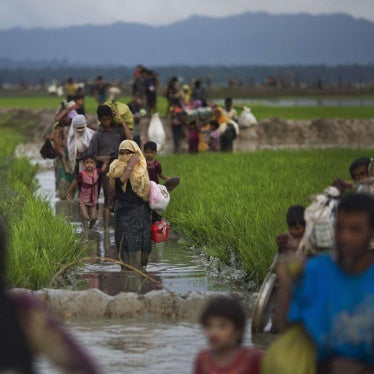(Mogadishu) – Maryam, a 37-year-old single mother who was gang raped in late 2012 in Somalia’s capital, Mogadishu, told us that she regretted going to the police almost as soon as she got to the police station.
The male officers abruptly ended the investigation when she started bleeding all over the floor.
“They told me to go home and wash off the blood,” she said. “But before they let me go, they told me I had to wash the floor where I was bleeding. I sat down, they gave me a brush and I cleaned the floor.”
Maryam never went back and the perpetrators of this dreadful attack remain at-large.
In more than two-dozen interviews that a Human Rights Watch colleague and I carried out with rape survivors in Mogadishu, Maryam was the only woman who reported her abuse to the police. Not surprisingly, when she was gang raped again a few months later, she stayed silent like the overwhelming majority of Somalia’s abuse victims.
Fear of rape is an everyday fact of life for many women and girls around the world. As the world marks International Women’s Month, it is time for a strategic approach to tackle even the toughest challenges—including Somalia.
In Somalia, two decades of civil conflict and state collapse have created a large population of displaced women who are especially vulnerable to sexual violence.
At the same time, years of conflict have destroyed the health and justice systems, which are profoundly ill equipped to support and assist rape victims and prevent attacks on others.
The United Nations reports nearly 800 cases of sexual and gender-based violence in Mogadishu alone within the space of six months in 2013; the reality is that the number could be much higher.
Many victims do not report rape because they do not trust the criminal justice system, lack access and knowledge of available health and justice services, and fear reprisal and stigma.
Although rape in Somalia has received increased government and international attention over the last year, the situation for women and girls remains bleak.
Our research found that armed assailants, including members of state security forces, operate with impunity as they sexually assault, rape, shoot and stab women.
Women and girls living in the capital’s dire displacement camps are abused in their makeshift homes and as they walk to market, tend to their fields, or forage for firewood. According to the UN Children’s Fund, about one-third of victims of sexual violence in Somalia are children.
The horrific reality for many rape survivors is that they are victimized twice: first by the sexual assault itself and then by the government’s failure to provide justice or medical and social support.
There is no doubt that Somalia faces enormous challenges, including preventing and responding to sexual violence. However, in areas where the government has significant control, including Mogadishu, progress is possible.
International agencies are investing significant resources in improving security and rebuilding government institutions, including the judiciary and health services. The government needs international support to convert the commitments it’s made on sexual violence to more than words on paper.
A comprehensive response to this crisis by the government should include providing survivors with immediate and urgent assistance. By focusing on prevention, emergency health services, access to justice, legal reform, and promoting women’s equality, the government can begin to turn this desperate situation around.
While confronting Somalia’s rape crisis is a long-term process, the government can take some fairly easy measures to help in the short term. A top priority is taking immediate steps to prevent retaliation against victims who allege sexual abuse, which occurred in three high-profile cases last year.
Instead of targeting victims who dare to speak out, the government should investigate cases and prosecute alleged perpetrators, including members of the security forces. This would send an unequivocal message that no one has a license to rape.
The government can further deter violence by organizing joint patrols of competent police officers and community representatives in camps for displaced persons, particularly at night. It should also provide services to reduce the need for women and girls in camps to undertake high-risk activities such as collecting firewood in remote areas and fetching water.
Preventing rape in the first place is the only way to spare victims the trauma of sexual violence and reduce the need for services.
Women must be able to report they have been raped to police without being ignored, judged or humiliated. Somalia’s police force will have to work hard to gain the trust of victims, many of whom have no confidence in the criminal justice system.
A “zero tolerance” policy should apply to any police officer implicated in sexual violence. And police should be trained to provide quick and appropriate response, and the skills to investigate crimes of sexual violence.
Washington and the international donor community should use their leverage to ensure that women do not endure Maryam’s dreadful experience.








